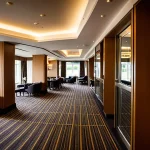The D8 Portuguese Visa is a gateway for non-EU/EEA nationals looking to embrace a new lifestyle in Portugal. This essential guide demystifies the eligibility criteria, application process, and the many benefits this visa offers, from legal work opportunities to access to public services. Discover how to successfully navigate your move, avoid common pitfalls, and thrive in Portugal’s vibrant digital nomad scene. Your adventure begins here!
Introduction to the D8 Portuguese Visa
The D8 Portuguese Visa, often referred to as the Digital Nomad Visa, offers non-EU/EEA nationals the opportunity to work remotely while living in Portugal for up to one year, with an option for renewal. This visa caters primarily to freelancers, remote employees, contractors, and digital entrepreneurs looking to benefit from Portugal’s rich cultural landscape and vibrant economy.
Have you seen this : Discovering Manchester”s Top Venues for Authentic English Breakfast Delights: A Culinary Adventure
To be eligible for this visa, applicants must demonstrate a valid remote job and meet specific financial requirements. A minimum monthly income of €3,280 is essential, accompanied by savings of at least €36,480 to support living expenses.
Applicants must provide comprehensive documentation, including proof of employment, three months of bank statements, proof of accommodation, and a clean criminal record. Extensive detail on financial and eligibility criteria is available in the study portuguese visa guide.
Also to discover : Which London neighborhoods are best for street art enthusiasts?
This visa also facilitates family reunification, thereby allowing spouses and dependents to accompany the primary applicant, provided income thresholds are adjusted accordingly. It paves the way for potential residency, offering access to healthcare, education, and public services similar to those in the Schengen Area.
Application Process and Documentation
The application process for the D8 Visa involves gathering required documents and meeting specific financial criteria, followed by submitting your application at the nearest Portuguese consulate.
Step-by-step Guide to the Application Process
The D8 Visa application process involves several well-defined steps, starting with ensuring you meet all the specified financial requirements for D8 Visa eligibility. Begin by gathering essential documents needed for D8 Visa, such as a valid passport, employment proof, and bank statements showing compliance with the D8 Visa financial requirements. Complete the visa application form accurately and book an appointment at your local Portuguese consulate. During the appointment, you will present your documentation and pay the D8 Visa processing fees, typically around €90.
Overview of Required Documents
Applicants must submit a comprehensive package of documents needed for D8 Visa processing. Essential paperwork includes proof of remote employment, income verification from the last three months, a clean criminal record, health insurance, and accommodation proof. Ensure all documents are accurate and up-to-date to avoid common mistakes in applying for D8 Visa applications, which could delay the timing for D8 Visa processing.
Explanation of Processing Fees and Timelines
D8 Visa processing fees and timelines can vary but generally include a €93 visa application fee, with potential additional costs for document translations and authentications. The timing for D8 Visa processing usually takes between 6-8 weeks, though scheduling an appointment for a residency permit may extend this timeframe. Applicants should anticipate a waiting period and plan accordingly to avoid unnecessary delays.
Life in Portugal with a D8 Visa
Living in Portugal on a D8 Visa brings the exciting opportunity to embrace a new lifestyle, integrating into the local culture while enjoying the benefits of working remotely from one of Europe’s most welcoming countries.
Overview of Lifestyle Adjustments for Visa Holders
Living in Portugal with a D8 Visa can bring profound changes. As a holder, you’re integrating into a culture rooted deeply in history and maritime tradition. Here, days might start with breakfast at a local café, followed by a stroll near an ancient castle. Cultural integration on the D8 Visa involves embracing the Portuguese language and customs, making an effort to be part of the vibrant local communities. While adapting to local taxes and legal systems, for instance, applying for a tax number in Portugal, might pose initial challenges, it ultimately facilitates smoother residency.
Professional opportunities with D8 Visa status open doors to remote work spaces in dynamic cities like Lisbon and Porto. These hubs present networking and collaboration chances, transcending borders. Though an initial challenge, finding accommodation with a D8 Visa is manageable with a variety of urban and suburban options. For many, the transition involves learning to balance personal and professional life amidst Portugal’s welcoming yet unfamiliar landscapes. Enjoy these steps towards a new, enriching Portuguese life.
















